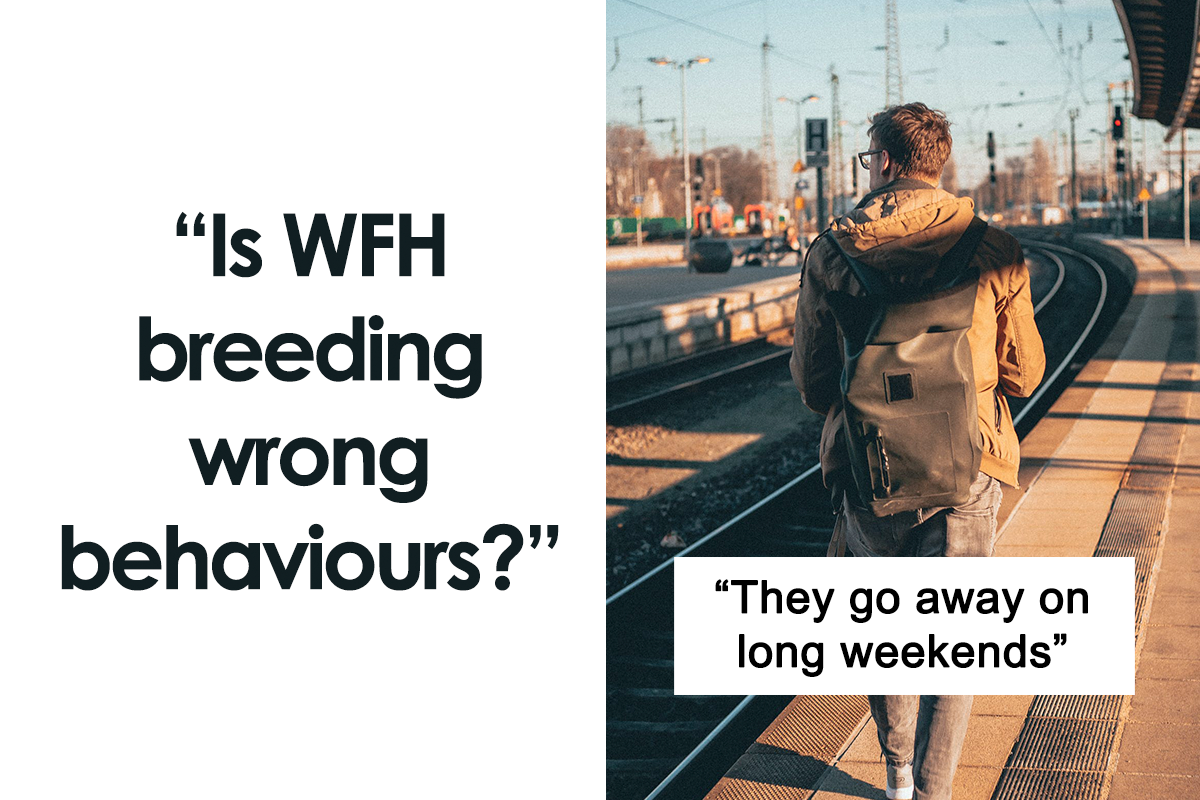
The Internet Is Ridiculing This Executive’s Rant Against People Working From Home On LinkedIn
InterviewLinkedIn is a place of contrast. It’s both super professional where experts network and promote themselves, as well as one of the biggest dumps of weird opinions about the job industry (not to mention exaggerated self-aggrandizing stories!) that you’ll find nearly anywhere on the net. The positive side is that these hot takes can ignite fiery discussions about pretty important topics.
One CEO did just that by ranting against working from home. In his mind, employees who spend more time with their loved ones or take better care of their physical and mental health are considered to be ‘wrong behaviors.’ Obviously, equating flexibility and freedom with entitlement sounds a bit silly. But it’s also what many bosses and managers think about WFH in secret while desperately trying to reassert their authority and get their workers back in the office.
Scroll down to read the CEO’s full LinkedIn post once it spread outside the site and to see how the internet reacted once it went viral. When you’re done, we’d love to hear your opinions about both the rant and working from home, dear Pandas. What do you personally think are the biggest pros and cons? Why do you think so many managers are against giving their employees more freedom and flexibility? Let us know what you think.
We got in touch with workplace expert Lynn Taylor to have a chat about working from home, why some executives despise the idea (whether it’s a resistance to change or their beliefs about efficiency), and both the pros and cons of WFH culture. “The fear of ‘out of sight, out of mind’ looms large” in some managers’ minds, she told us, adding that the shift to working from home is not going away, and that hybrid work environments might act as the perfect compromise.
“For some companies, industries, and positions, employees do need to be on site. But for those where it won’t affect their work product, managers must be open-minded about offering the flexibility and freedom of working from home. That is if they want to attract and retain the most qualified people,” Lynn, the author of ‘Tame Your Terrible Office Tyrant’ and the head of the fashion brand ‘Behind the Buckle,’ told Bored Panda.
We also reached out to redditor u/iwillforgetthissmh who was one of the people who saw the original LinkedIn post and helped make it viral. You’ll find both of Bored Panda’s exclusive interviews with Lynn and u/iwillforgetthissmh below.
Working from home has flustered quite a few bosses who think that better working conditions for employees are worse than the devil
Image credits: Unsplash (not the actual photo)
One rant about WFH culture went viral on LinkedIn and elsewhere. Some of the ideas the executive shared sound absolutely ludicrous
Image credits: Bored Panda
Image credits: iwillforgetthissmh
According to author and workplace expert Lynn, there isn’t one single reason why some bosses and managers aren’t head-over-heels in support of their employees working from home. “One of the reasons some managers are opposed to work from home policies, for example, is they feel there is a lack of productivity when you can’t meet face-to-face. They believe that project teams are less effective when working offsite,” Lynn explained how management tends to think.
“Managers may feel their own results and successes are negatively impacted because they can’t interface personally with their staff; brainstorm as easily, or react to unexpected issues on the spot. They may also feel they can’t train their employees properly when they’re offsite,” she told Bored Panda. “For others, it’s simply resistance to change. If they’re much more traditional in their management approach, they may want to exert maximum control over their staff and be assured everyone is committed. The fear of ‘out of sight, out of mind’ looms large.”
Lynn pointed out that she talks about overbearing managers who are more concerned with style than substance in her book, ‘Tame Your Terrible Office Tyrant: How to Manage Childish Boss Behavior and Thrive in Your Job.’
Working from home has a wide range of upsides and downsides. Here are some of the main ones
The workplace expert was kind enough to share her insights about the pros and cons of WFH culture. Here are some of the main benefits that she sees: “Employees have had a taste of remote work and for many, it’s hard to go back to a traditional work environment. This has been underscored by the Great Resignation. Employees have seen productivity benefits; better focus; no commute time; and less on-site politics and gossip.”
She continued: “That’s not to mention the fact that they can better attend to family and personal matters. This greater work-life balance and flexibility is a major stress reducer—and for many, is even worth a pay cut, if not a job change.”
However, that’s not to say that working from home is perfect. It still has its own downsides. Here are some that Lynn has noticed: “Some managers do need their employees on-site, especially those where required face to face interaction with customers or other employees is necessary. In addition, when everything is left to offsite work, there is a loss of spontaneity and the human bond that occurs when you’re physically visible. And a larger human need is to build something impactful together, as a team or ‘community,” she said.
According to Lynn, when this is eliminated, it can create isolation and even depression. “In my Psychology Today blog, I often address how employees can make the transition back to the office easier, regardless of the new work structure,” she shared.
“Further, more junior employees don’t get the benefit of observing mentors and managers in action, or solving spur-of-the-moment problems real-time. There is much more to advancing in your career than interfacing with people on a screen. Social skills, diplomacy and other lifelong emotional intelligence abilities are likely being adversely affected for those in the early stages of their career,” Lynn told Bored Panda.
In the workplace expert’s opinion, everyone needs to try and look at the big picture. “All that said, this new work paradigm has revealed just how much can be accomplished digitally, much to the surprise of those at every level. It also demonstrates that much of what corporate America thought was a necessity, is no longer. Many companies are happy to reduce their real estate expenses, as well,” she said.
“The remote work revolution is putting productivity under a microscope. A digital relationship removes virtually all personal aspects good or bad. It removes downtime from a traditional work environment, such as water cooler chit-chat. But some could argue it also removes camaraderie.”
The hybrid workplace could be the perfect compromise, giving employees and management the best of both worlds. That way, there would be some personal interaction throughout the week, but employees can also focus more effectively in their controlled home environments, as well.
Maintaining good communication between management and the employees is essential
“Whether it’s a hybrid environment or working from home, employees will need to make an extra effort to communicate often with their managers—and regularly keep them apprised of project status. This is not just good business, it protects job security and means better results.” She added that above everything, employees can’t go wrong if they do superb work.
“The downsides of remote work can be mitigated with a hybrid work environment. This allows the best of both worlds. And it appears more advantageous than, say, a four-day workweek, which can result in people working later hours or overtime, regardless. If they end up working on a fifth day to keep pace, it defeats the purpose, such as when clients or vendors need to reach them on that extra day,” the expert pointed out that hybrid systems might hold certain advantages over potential alternatives like shorter workweeks.
However, this doesn’t mean that the WFH trend is going to consistently grow from here on out. Certain events might derail the advancement of WFH culture. “When the pendulum swings back to the employer, such as when employment skyrockets in the future and landing a job is more difficult, the situation may change. Employees may feel compelled to have greater face time in the office to preserve their coveted jobs,” Lynn warned about the future.
“Regardless of the state of the economy, the work from home landscape is creating more project workers and consultants. Because of the positive experience working from home, many have now shifted to independent work, especially when employers have insisted they return full-time. Employers may lose valued talent to this alternate option by not offering the flexibility of remote work,” she said.
The workplace expert noted that there are benefits when it comes to increasing productivity with employees working from home. However, this doesn’t mean that employees have a blank cheque to do whatever they want. “Of course, any employee that abuses the privilege of working offsite won’t remain long-term at any company,” she pointed out that it’s important to perform well if you want to have a good career.
A hybrid work model seems like the most attractive option to keep everyone happy
Like many of us, redditor u/iwillforgetthissmh, who helped spread the news about the LinkedIn post, initially thought that the executive’s rant was a joke or satire. “Looking at it, it’s a list of benefits workers get from WFH—so how is this bad? It took me reading the comments to realize the poster seriously considered WFH a threat which is mental!” the redditor shared their thoughts with Bored Panda.
They believe that a lot of the resistance bosses and managers feel towards WFH culture is “to do with a God complex and desire to control others using their position in leadership as an excuse.” The desire for control, in other words, lies at the core of the drive to bring everyone back to the office.
“If they’re struggling to control other aspects of their life, they use their position to exercise that control in their professional lives. It’s all down to micromanaging and wanting to follow every move of your subordinates. Not out of care for them or their benefit, but in order to feel superior and have full control.”
Redditor u/iwillforgetthissmh mainly sees the pros of working from home and they’re a huge fan of this style of work. “I loved WFH as it saves time on commute and I can afford to sleep in. I also concentrate better as in the office we always chat or go out for coffee/lunch which takes out a lot of time and can break my concentration,” they opened up to us. On the flip side, working from home means that there isn’t as clear a boundary between work life and private life.
“I would be happy with a hybrid approach, but personally will not go back to the office full-time,” they explained what conditions work best for them.
“I think for bosses to realize WFH provides a lot of freedom and flexibility will depend on their own flexibility when it comes to new ideas. I doubt someone like the author of the [LinkedIn] post would ever see the benefit of treating your employees like people and not slaves,” they said.
“For others who are not focused on micromanagement, looking at the overall well-being of their staff as well as their performance, should be a good indicator that this approach is working and should continue being an option for those who do prefer WFH.”
Here’s how some people reacted to the LinkedIn rant. Some of the things these redditors said were practically dripping with sarcasm
The executive clearly believes that people’s entire lives should revolve around their jobs. They should prioritize their jobs above everything; personal needs should be secondary to showing up at the office, efficiency and job satisfaction be damned!
After more than two years of the Covid-19 pandemic, it’s frankly exhausting to listen to managers drone on and on about the supposed benefits of office life. The fact is that having tried both approaches, people know what works best for them. Some folks can’t exist without the hustle and bustle atmosphere of a crowded open-plan office. Good for them. Meanwhile, others prioritize cutting down their commute time to zero so that they can exercise, sleep better, and spend more time with their kids. There is absolutely nothing wrong with wanting that.
At the end of the day, the results speak for themselves. If someone gets all their work done on time, does their job well, and manages to stay invested in the future of the company, why drag them to the office? Meanwhile, if an employee is demotivated and lagging behind, it might not be because they’re not at the office: they might be stuck in a dead-end position and are rethinking their career choices. That or the company fails to inspire them to go the extra mile. Let’s be frank—free coffee, watercooler gossip, and meetings won’t solve deep-seated issues in the corporation’s culture and approach.
Working from the office relates very closely to the 9-5 work model. Recently, Bored Panda spoke about this with financial expert Sam Dogen, the author of ‘Buy This, Not That’ and the founder of ‘Financial Samurai.’ He stressed that when it comes to jobs related to tech and the creator economy, there’s a need for more flexibility to avoid wasting everyone’s time.
“The 9-5 work model still has a place for necessity businesses in the services space. We’re talking physical therapy, medicine, restaurants, flooring, and so forth. Customers need reliable businesses with reliable hours. However, for the technology and creator economy, the 9-5 work model is outdated. Having a regimented 9-5 schedule creates a lot of wasted time,” he told us during an interview previously.
“Let’s be honest. Most people who go to work on a set schedule spend a good amount of hours surfing the net, chatting with colleagues, and taking lots of breaks. Instead, work hours should be more flexible to suit the modern-day needs of ‘knowledge’ workers today,” Sam said.
“Besides steady raises and promotions, an employee can get motivated if they remember their company’s mission. For example, if you are working at a company whose mission is to alleviate child poverty, then you should be pumped to work every day!” he stressed that it’s important to see deep purpose in your job if you want to feel motivated and energized.
“But if your company’s mission is to keep users addicted to getting likes on social media, then you’ve got to work on building good relationships with your colleagues and managers. At the end of the day, people join people, not firms. Therefore, the stronger your relationships with your colleagues, the more you will enjoy work. And if that means having a ping pong tournament every Wednesday, so be it!” he said that employees shouldn’t ignore the importance of good relations with fellow coworkers.
He also shared some thoughts about managing managers, especially those who expect you to work overtime all the time. “A harmonious work experience is all about setting and meeting appropriate expectations. Of course, you should try and be proactive and do more of what’s asked of you. However, after several months of going above and beyond, you must bring up your good work and your expectations of a raise and a promotion during your semi-annual review,” the expert said that hard work and good results ought to be rewarded.
Is the work still getting done? Is the company still profitable and meeting its goals? Then stfu.
What's wrong with taking a midday nap? If it's during your lunch break, it's no one's business and can also be a positive thing, making you more active and alert for the rest of the day. Not seeing why not wanting to travel to work is a bad thing, especially for people who rely on cars to get there, also not having to rely on public transportation reduces the spread of germs an viruses (and I don't just mean Covid) We have seen a huge decrease of people calling in sick in the past 2 years and productivity has never been better The rest of what he wrote is BS.
There's nothing wrong with it. It's called a siesta, and its LITERALLY REQUIRED in some areas of the world.
Load More Replies...My favorite thing to come out of The Great Resignation is employers just blatantly outting themselves as monsters. Not even bothering to hide it anymore. Just outright stating "I don't view my employees as human beings, so why should I be expected to treat them like human beings?"
Hahahaha. I laughed at that really hard. That's exactly what they are doing. I enjoy it as well.
Load More Replies...Is the work still getting done? Is the company still profitable and meeting its goals? Then stfu.
What's wrong with taking a midday nap? If it's during your lunch break, it's no one's business and can also be a positive thing, making you more active and alert for the rest of the day. Not seeing why not wanting to travel to work is a bad thing, especially for people who rely on cars to get there, also not having to rely on public transportation reduces the spread of germs an viruses (and I don't just mean Covid) We have seen a huge decrease of people calling in sick in the past 2 years and productivity has never been better The rest of what he wrote is BS.
There's nothing wrong with it. It's called a siesta, and its LITERALLY REQUIRED in some areas of the world.
Load More Replies...My favorite thing to come out of The Great Resignation is employers just blatantly outting themselves as monsters. Not even bothering to hide it anymore. Just outright stating "I don't view my employees as human beings, so why should I be expected to treat them like human beings?"
Hahahaha. I laughed at that really hard. That's exactly what they are doing. I enjoy it as well.
Load More Replies...
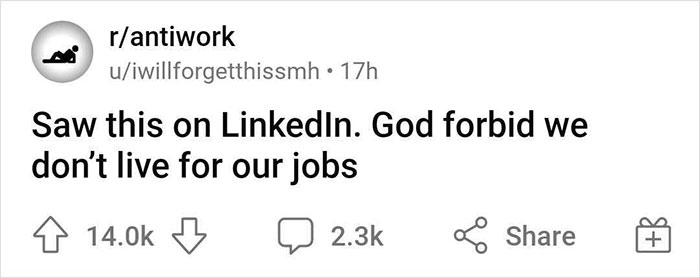
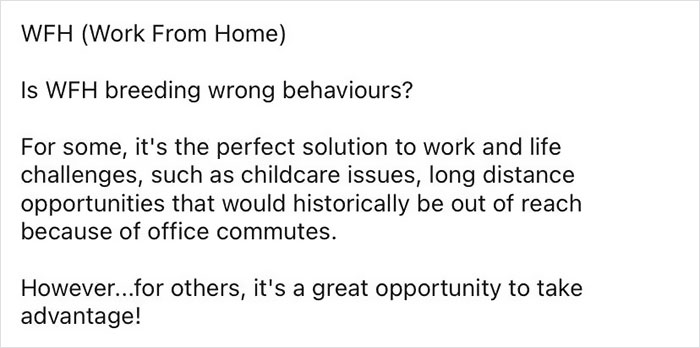
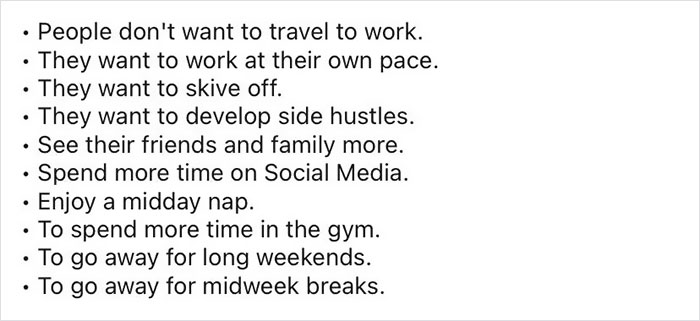


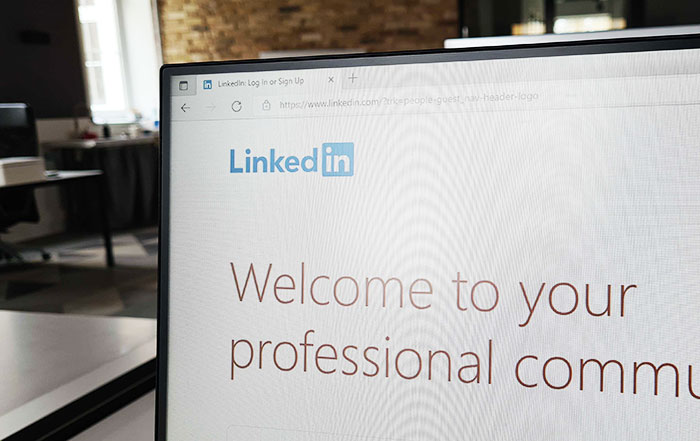
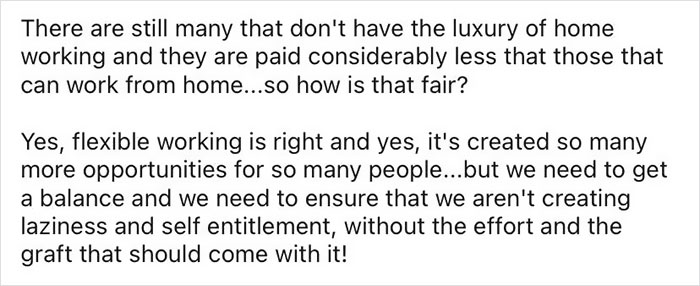
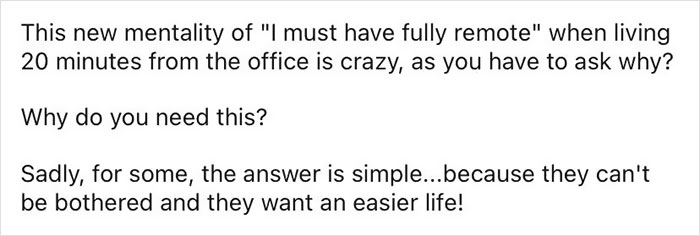
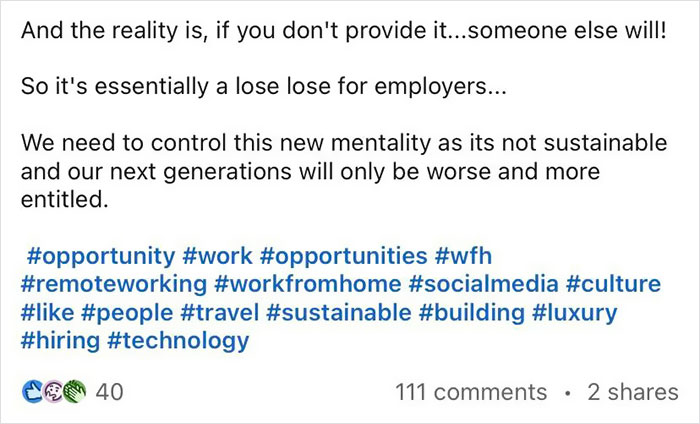



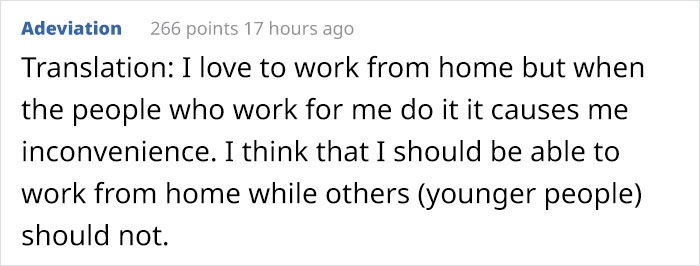






















85
71